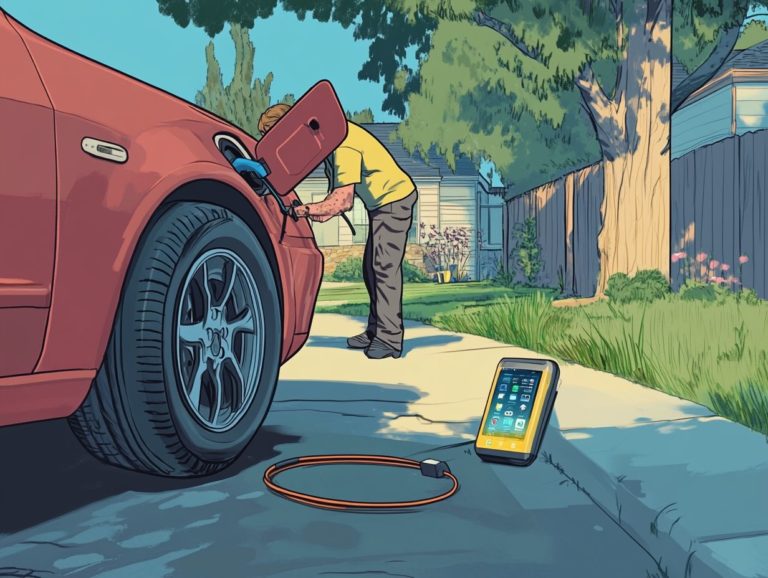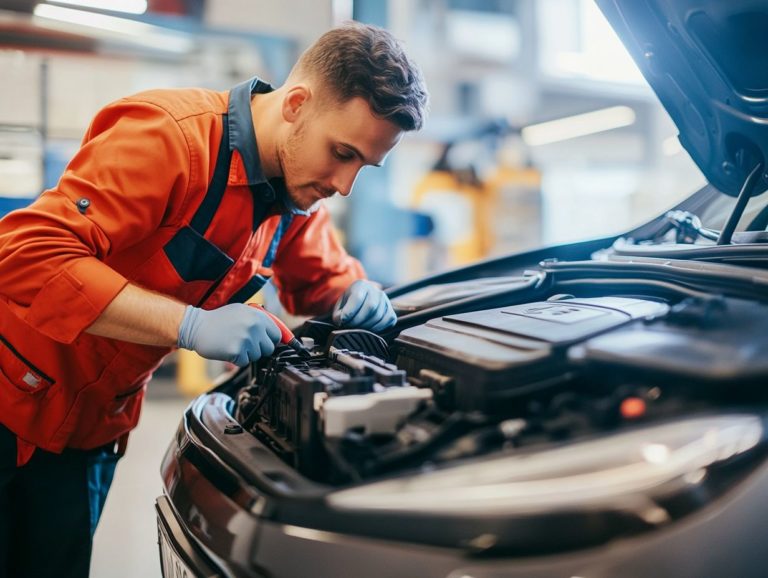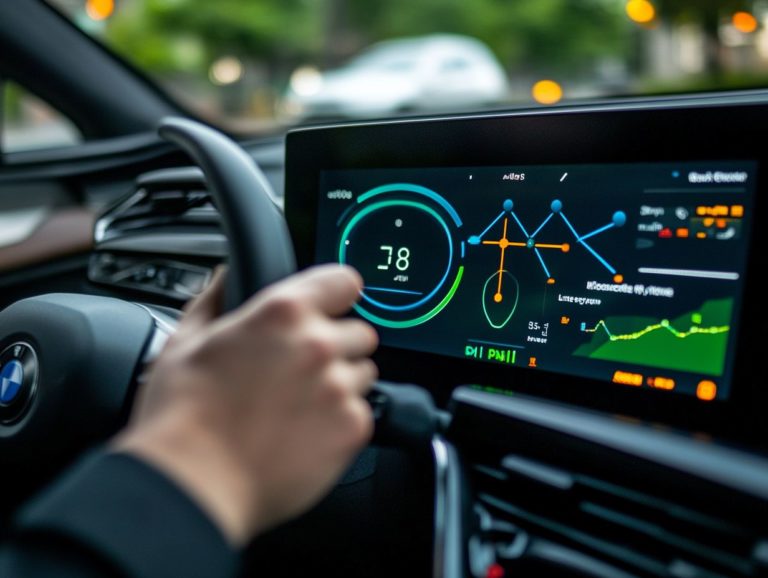Understanding EV Warranty and Maintenance
As electric vehicles (EVs) revolutionize the automotive landscape, it s essential for you to grasp their warranties and maintenance needs.
This article unpacks what your EV warranty covers, explores the various types available, and emphasizes the significance of regular maintenance to ensure your vehicle operates at its best.
From battery management to tire inspections, you ll find a comprehensive guide to key maintenance tasks, along with tips to maximize your warranty benefits.
Dive in with us as you navigate the fundamentals of EV ownership!
Contents
- Key Takeaways:
- What is Covered Under an EV Warranty?
- Types of EV Warranties
- Common Maintenance Tasks for EVs
- Maximizing Your EV’s Warranty and Maintenance Benefits
- Frequently Asked Questions
- What is an EV warranty and why is it important?
- What does an EV warranty typically cover?
- Are there different types of EV warranties?
- Is maintenance different for an electric vehicle compared to a traditional gas-powered vehicle?
- Does the EV warranty cover normal wear and tear?
- Can I purchase an extended warranty for my electric vehicle?
Key Takeaways:
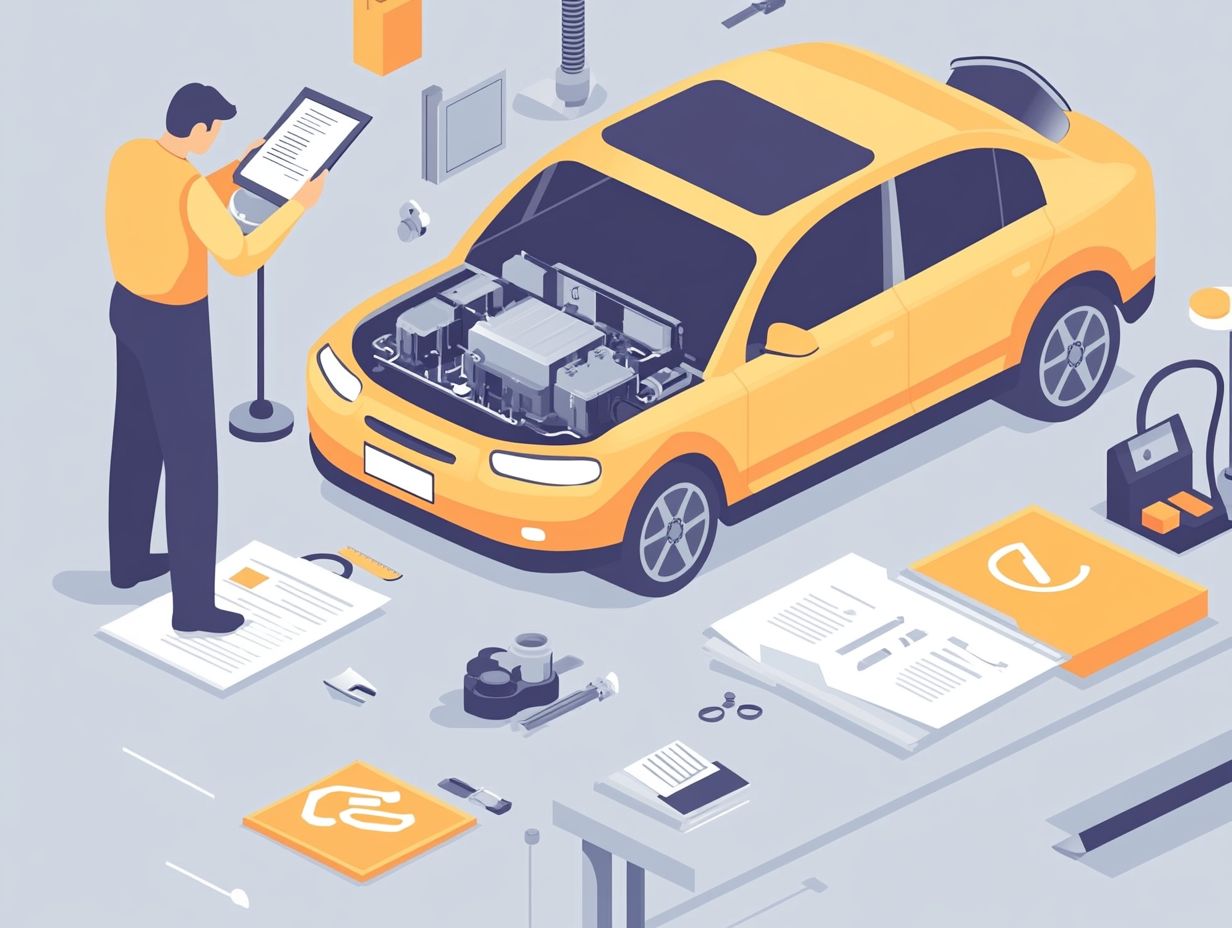
- Regular maintenance is crucial for prolonging the lifespan and maximizing the benefits of your EV warranty.
- Understanding the different types of EV warranties, such as manufacturer and extended warranties, can help you make informed decisions when purchasing an EV.
- Common maintenance tasks for EVs include battery, brake, and tire maintenance. These should be performed regularly to ensure optimal performance and safety.
What is Covered Under an EV Warranty?
An EV warranty is a cornerstone of electric vehicle ownership. It provides a vital safety net for various performance aspects especially the advanced batteries and high-voltage systems that drive these innovative machines.
Manufacturers meticulously design these warranties to encompass critical elements like battery life, charging cycles, and regenerative braking (a system that helps recharge the battery while slowing down). This ensures you have peace of mind regarding potential repairs and maintenance expenses.
Depending on the manufacturer, this warranty may also feature tailored options for extended coverage, including additional components that go beyond the standard vehicle warranty.
Importance of Regular Maintenance for EVs
Regular maintenance for your electric vehicle (EV) is essential. It not only meets safety requirements but also helps to optimize its performance and extend its lifespan.
Although EVs typically require less upkeep than conventional vehicles, sticking to a maintenance schedule can greatly enhance your battery life and overall reliability.
You ll need to keep an eye on specific maintenance aspects, such as fluid checks. Monitoring coolant levels is crucial for thermal management (keeping the battery cool) and battery efficiency.
While the brake system in EVs experiences less wear due to regenerative braking, it s still important to conduct periodic inspections to ensure safety. These components may face different stresses compared to traditional systems, so vigilance is key.
High-voltage system inspections are also vital. Any issues here can lead to costly repairs down the line.
Interestingly, recent data shows that the average annual maintenance cost for EVs is approximately 50% lower than that of gasoline-powered vehicles. This reinforces the notion that routine upkeep can lead to significant long-term savings.
Types of EV Warranties
When you contemplate electric vehicles, grasping the nuances of EV warranties is crucial for enhancing your ownership experience. There are two primary types of EV warranties to consider: manufacturer warranties and extended warranties.
Each of these options provides differing levels of coverage. They are meticulously designed to cater to your specific needs as a vehicle owner. Making an informed choice here can significantly impact your journey with your electric vehicle.
Take the time to check your EV’s warranty and maintenance schedule to make the most out of your driving experience!
Manufacturer Warranties
Manufacturer warranties for electric vehicles cover essential parts critical to both performance and safety, including advanced batteries and power systems. These warranties are a result of rigorous safety testing to help you trust the reliability of your electric drive.
These warranties usually cover a specific duration typically three to eight years or until a certain mileage limit is reached. For example, Tesla offers an eight-year warranty on their battery and drive unit, showcasing their commitment to durability.
In contrast, Nissan provides a five-year or 60,000-mile warranty on the Leaf model s battery, along with an eight-year, 100,000-mile warranty for battery capacity loss. It s vital to be aware that each manufacturer has its own limitations, especially regarding what is not covered if there s damage from accidents or improper maintenance. Understanding the fine print is essential for every vehicle owner.
Extended Warranties
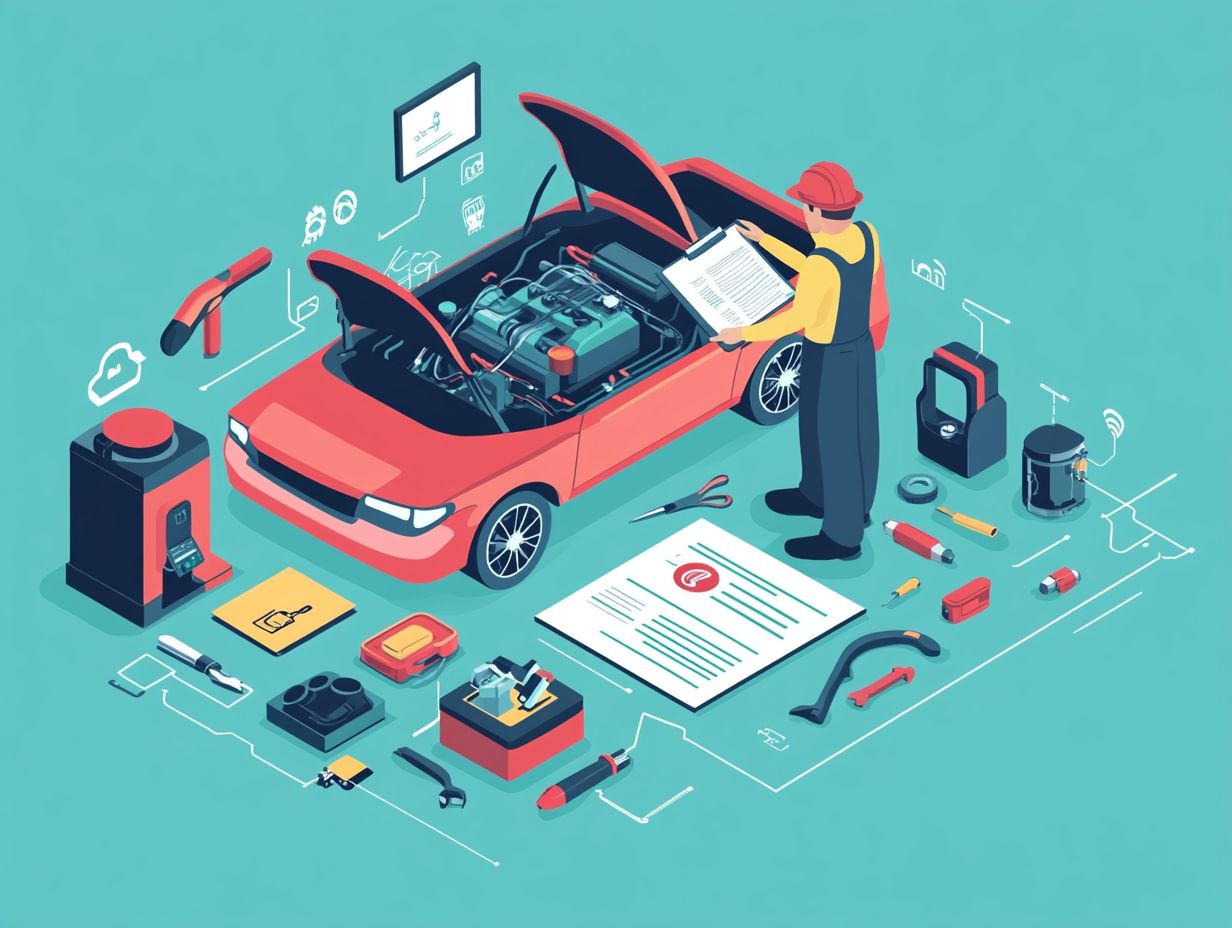
Extended warranties for electric vehicles provide an extra layer of protection, prolonging your original warranty beyond its expiration. These warranties often include coverage for battery replacement, access to repair services, and specific high-voltage components that may fail over time.
This added assurance can lead to significant savings on repairs and maintenance costs as your vehicle ages. When considering an extended warranty, ensure that the duration of coverage aligns with your vehicle’s expected lifespan.
Researching the reputation of the warranty provider can be invaluable. Choosing a trusted provider enhances your peace of mind and ensures you re making a sound investment in your vehicle’s future.
Common Maintenance Tasks for EVs
Maintaining your electric vehicle involves a variety of essential tasks that ensure optimal performance and extend its lifespan. Key duties include battery care, brake upkeep, and tire maintenance, each requiring specific attention to protect your electric drive system and enhance safety on the road.
By prioritizing these tasks, you can enjoy a smooth and reliable driving experience for years to come.
Battery Maintenance and Replacement
Battery maintenance is crucial for electric vehicle ownership, as the battery is the heart of your electric drive system. Its condition directly influences both battery life and overall performance. Regularly monitoring charging cycles and adopting best practices for battery management can significantly extend your EV’s battery lifespan, effectively delaying costly replacements.
To keep your vehicle performing at its best, adopt effective charging methods. Avoid extreme discharges and aim to charge to around 80% instead of a full 100%. Temperature management is also important; keeping your battery cool during charging helps prevent heat-related damage that could compromise performance.
Watch for indicators like reduced range or unusual noises, as these may indicate your battery needs replacement. Fortunately, many manufacturers offer warranties that cover battery replacements, providing you with peace of mind and reducing financial stress related to unexpected repairs.
Brake Maintenance
Brake maintenance in electric vehicles comes with its own set of special things to consider, largely due to the inclusion of regenerative braking systems. This system captures energy during braking to recharge the battery.
To ensure your safety and the reliability of your vehicle, it’s essential to grasp the differences in brake system maintenance between EVs and conventional vehicles.
These regenerative systems include components that need regular inspections to maintain optimal performance. A breakdown here can hinder energy recovery and result in unnecessary wear on traditional brake pads.
As an EV owner, you’ll likely notice that your maintenance schedule varies significantly. You’ll find that brake pad replacements occur less frequently due to the reduced reliance on friction-based braking.
However, this doesn’t mean you can overlook periodic checks of brake fluid levels, lines, and other components, as these can impact your overall maintenance costs.
Ultimately, staying informed about these specific maintenance tasks is crucial for ensuring that your electric vehicle operates smoothly and effectively.
Tire Maintenance
Tire maintenance is essential for your safety and performance! By giving your tires the proper care and conducting regular checks, you can significantly enhance safety, performance, and energy efficiency.
Establishing a consistent maintenance schedule allows you to prevent uneven wear and extend the lifespan of your tires. This ensures your electric vehicle operates at its best.
Rotating your tires every 5,000 to 8,000 miles is a smart move as it helps distribute wear evenly. Regular alignment checks will ensure that your steering and handling remain sharp.
Don’t overlook tire pressure; monitoring it is crucial. Under-inflated tires can increase rolling resistance, negatively affecting your battery range and overall efficiency.
Selecting the right tire brands plays a pivotal role in performance. Consider options like:
- Michelin: Known for exceptional durability and performance.
- Bridgestone: Offers a variety of tires with excellent traction.
- Continental: Renowned for low rolling resistance and eco-friendly options.
By prioritizing these maintenance practices and opting for quality tires, you can enjoy a smoother ride, enhanced safety, and impressive energy efficiency.
Maximizing Your EV’s Warranty and Maintenance Benefits
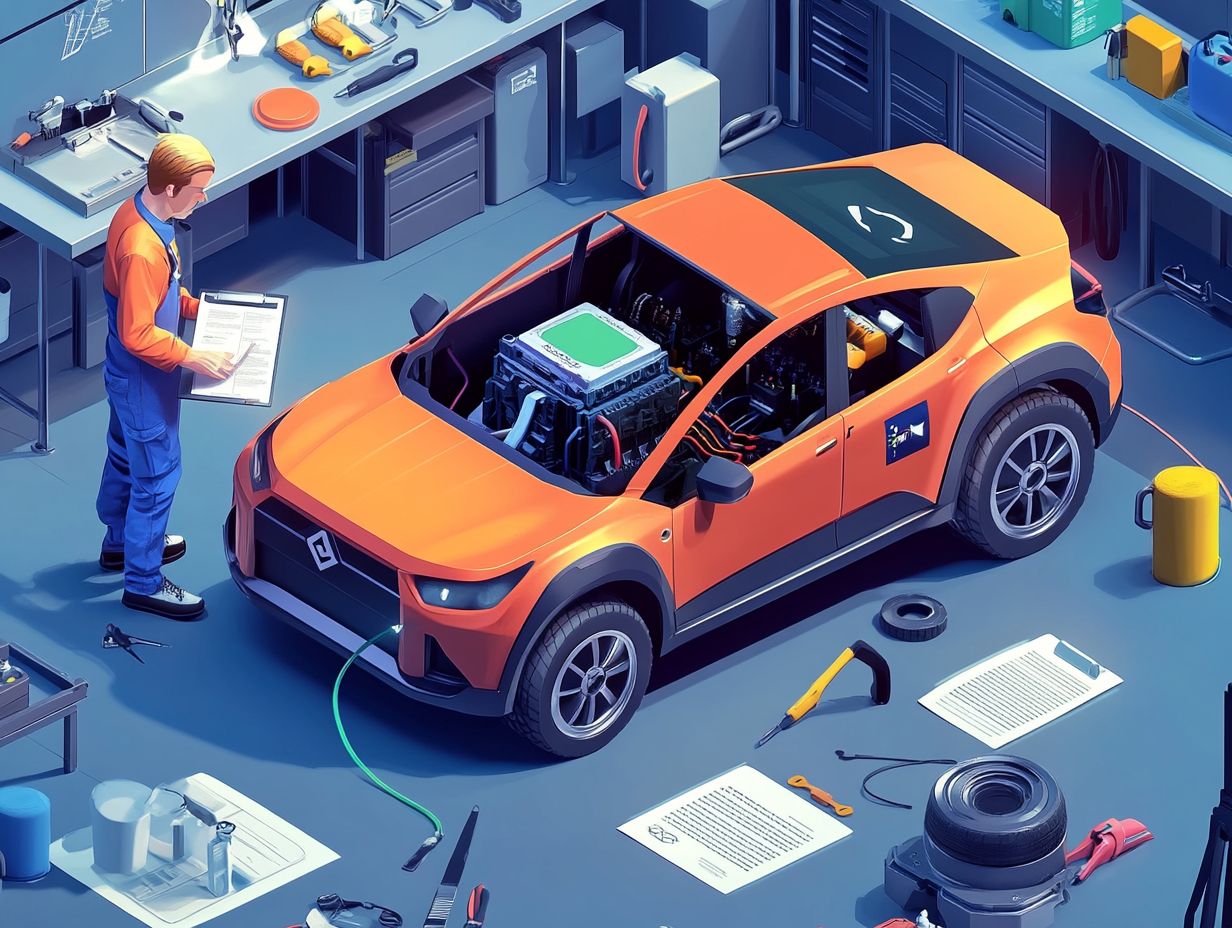
To truly maximize the advantages of your electric vehicle’s warranty and maintenance coverage, you must understand the terms of your warranty and the unique maintenance requirements of your specific vehicle model.
By proactively scheduling regular check-ups and understanding what your warranty encompasses, you can effectively sidestep unexpected EV repairs. This paves the way for enduring satisfaction with your investment.
Tips for Maintaining Your EV
Proper maintenance of electric vehicles demands more than just the occasional check-up; it requires a keen understanding of specific tips designed for your EV.
By focusing on crucial aspects like battery cooling and adhering to a structured maintenance schedule, you can significantly improve your vehicle’s performance and longevity.
To enjoy a seamless driving experience, regularly monitor battery health by checking indicators that reveal charging cycles and overall battery capacity.
Optimizing your charging practices such as using home charging stations during off-peak hours will help preserve battery life and reduce costs.
Keeping your software updated allows your vehicle to benefit from the latest features and improvements, enhancing efficiency and performance.
Embracing preventative measures, like checking tire pressure and maintaining brake systems, can lead to fewer repairs. This ensures that each journey is smoother and more enjoyable on the road.
Start your maintenance today and enjoy a safer, more efficient drive!
How to Make the Most of Your Warranty Coverage
Making the most of your warranty coverage for electric vehicles means understanding the details of your policy. It also involves mastering the art of navigating warranty claims, which is the process of asking for repairs under your warranty. By being proactive in maintaining your vehicle and knowing your rights under the warranty, you can prevent disruptions and ensure you receive the necessary repair services when the need arises.
To start, it s crucial to keep detailed records of all maintenance activities and repairs. These will serve as vital evidence when filing claims. When common issues arise, like battery performance discrepancies or charging system failures, documenting these problems with photos and detailed descriptions will enhance your communication with manufacturers.
Taking the time to familiarize yourself with the warranty’s fine print can reveal what is and isn t covered, so you re never caught off guard. Being polite and clear when you talk to customer service representatives can lead to quicker solutions.
Frequently Asked Questions
What is an EV warranty and why is it important?
An EV warranty is a guarantee from the manufacturer that covers repairs and replacements for certain parts of the electric vehicle. It s essential because it saves you money on surprise repairs and gives you peace of mind.
What does an EV warranty typically cover?

An EV warranty typically covers the electric motor, battery pack, and other major components of the vehicle. It may also include roadside assistance and regular maintenance services.
Are there different types of EV warranties?
Yes, there are different types of EV warranties offered by manufacturers. They can vary in length, coverage, and terms. It s important to research and compare warranties before purchasing an electric vehicle.
Is maintenance different for an electric vehicle compared to a traditional gas-powered vehicle?
Yes, maintenance for an electric vehicle is generally simpler and less frequent than for a traditional gas-powered vehicle. This is because there are fewer moving parts and no need for oil changes.
Does the EV warranty cover normal wear and tear?
No, an EV warranty typically does not cover normal wear and tear or damage caused by accidents or improper use. It s important to follow the manufacturer’s recommended maintenance schedule to ensure the warranty remains valid.
Can I purchase an extended warranty for my electric vehicle?
Yes, some manufacturers offer extended warranties for electric vehicles. These can provide additional coverage and peace of mind for a longer period. However, it s important to carefully consider the cost and coverage before purchasing an extended warranty.
Start keeping track of your vehicle s maintenance today!

